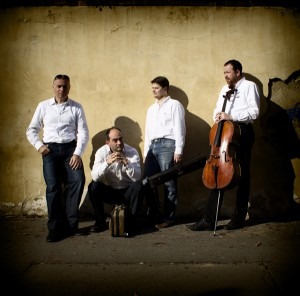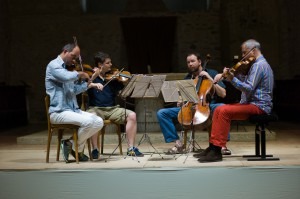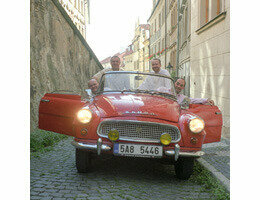
Credit: Bernard Martinez
We were recently in Paris, speaking with the 2 members of the Talich Quartet. Vladimír Bukač, Violist and Roman Patočka, Violin II, took time out from their busy concert schedule to sit down with us.
The quartet was founded in Prague in 1964 by violinist Jan Talich, Sr, and, this year, celebrate their 50th anniversary. The lineup has changed over that time, but still continues with a Talich as leading member. In 1970, after leading the quartet as Violin 1, Jan Talich moved to play Viola, leading the quartet from that instrument. This unusual move occurred on the suggestion of his teacher, who felt that the quartet needed a stronger viola player and suggested that the leader change instruments. Petr Messieurer took his position on Violin 1. With Jan Sr on Viola until 2000, the addition of Jan Jr on Violin 1 in 1997 meant that there was a smooth transition to the new leadership. When Jan Jr came, he brought with him Petr Prause on cello, who replaced Evžen Rattay, who had been with the quartet since its beginning. Vladimir Bukač was on Violin II (later replaced by Peter Petr Maceček and then, in 2011, by Roman Patočka) then he moved to Viola with the retirement of Jan Sr. Over the 50-year history of the ensemble, the sequential changes of membership have resulted in a gradually younger ensemble, now roughly 25 years younger than the people they replaced, but yet the ensemble could maintain continuity.
When Jan Jr took over the leadership in 1997, he brought a new musicality that fit the ensemble well. We noted that the older recordings seemed to sound a bit more conservative and a lot of this had to do with changes in Eastern Europe. The younger players have had a greater opportunity to study in the West whereas, in the past, the only place to study outside the country was in Russia. In Russia, players could gain a tremendous technical grounding, but it was from the West that the changes as fundamental as articulation and repertoire were happening. Although players who studied abroad came back with a different sound, the group felt that they had been very successful in retaining their Czech “musical DNA.”
 When asked about repertoire choices, they noted that they played everything from Bach to Bartók, but admitted that 12-tone and serial music of the 20th and 21st century remained something that they left to other groups. On the other hand, they noted dryly, dodecaphonic quartets probably have difficulty playing Mozart…!
When asked about repertoire choices, they noted that they played everything from Bach to Bartók, but admitted that 12-tone and serial music of the 20th and 21st century remained something that they left to other groups. On the other hand, they noted dryly, dodecaphonic quartets probably have difficulty playing Mozart…!
Smetana
String Quartet No. 1 in E Minor, “From my life”
Allegro vivo – Appassionato
When we discussed programing and recordings, the quartet came very much to the here and now and talked about the market and market demands. They discuss programming, but unless a promoter or record company wants to present that repertoire, it won’t get played. Often the discussions with promoters or labels are negotiations – an organizer may want specific pieces or specific composers’ work for their festivals or concert programs. The quartet can offer, but unless there’s demand, there’s no sale. The quartet indicated that mixed programs, where there is more than just a quartet playing, seem to be currently successful. They noted with interest a program they’d seen by Gideon Kramer that had everything from trios and arias to quartet and quintets and that this variety of ensembles within one concert was successful in reaching a larger audience.
When we asked about their rehearsal schedule, they noted that they used to rehearse every day, but now, with the income from concert playing so unstable, everyone has a side job teaching or conducting or playing in an orchestra. They did view their concerts as important focal points and saw each as a development from the one before.
The ensemble has had a long and successful career, both within the Czech Republic and in Europe and America. They have made some inroads into the Asian market but wish they could do more. Their relatively young label, La Dolce Volta, has been able to bring nearly their entire back catalogue into print again, so everything from their early recordings in the 1960s to the new work they’ve done recently is available. A unique quartet with a unique outlook on what they do best is a valuable group to keep an eye on!
The Talich Quartet
Official Website






